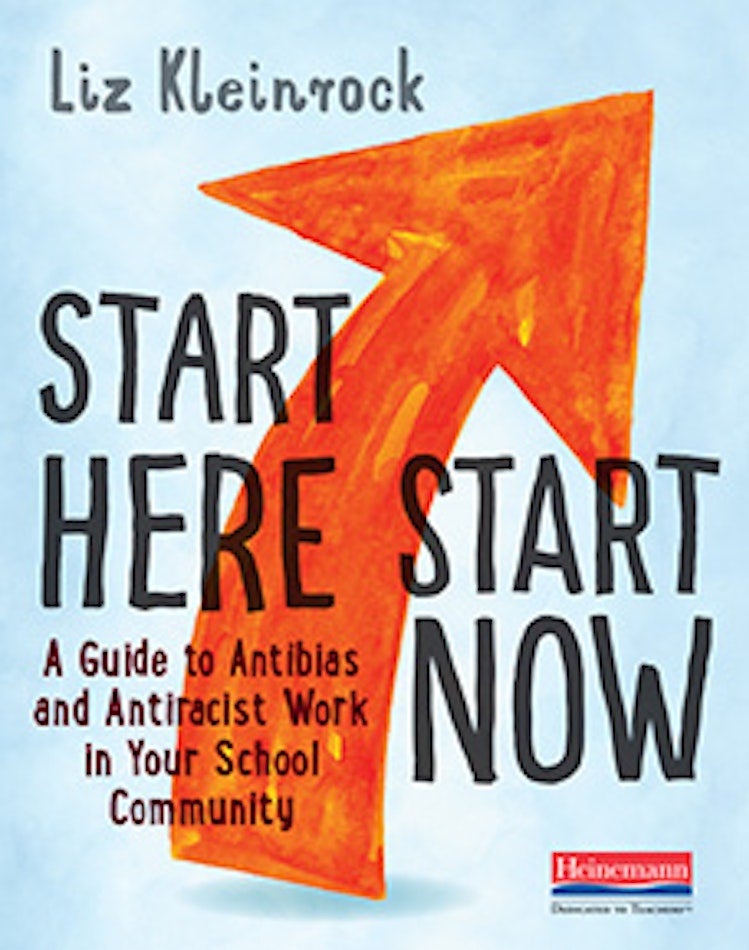UCLA alumna at the forefront of promoting antibias, antiracist work in school communities nationwide.
In Liz Kleinrock’s (’13, M.Ed.) recent book, “Start Here, Start Now: A Guide to Antibias and Antiracist Work in your School Community,” she addresses many of the questions and challenges educators have about getting started with antibias and antiracist work, using a framework for tackling perceived barriers from a proactive stance. Kleinrock answers the questions with personal stories, sample lessons, anchor charts, resources, conversation starters, extensive teacher and activist accounts, and more.
“We can break the habits that are holding us back from this work and be empowered to take the first step towards reimagining the possibilities of how antibias antiracist (ABAR) work can transform schools and the world at large,” writes Kleinrock in an introductory chapter of “Start Here, Start Now.” “We must remind ourselves that what is right is often not what is easy, and we must continue to dream. Amidst the chaos, our path ahead is clear. This is our chance to dream big and build something better.”
Kleinrock is an educator and consultant based in Washington, D.C. A transracial adoptee, Liz was born in South Korea and grew up in D.C. before attending Washington University in St. Louis, Missouri. After graduating, she moved to Oakland, California, where she served as an AmeriCorps teacher with Girls Inc. and Super Stars Literacy for two years. Following her service, Kleinrock moved to Los Angeles, where she attended UCLA’s Teacher Education Program (TEP) and earned her M.Ed. After spending a year student teaching a 5th grade class in Watts, Kleinrock joined the founding faculty of a startup school in East Hollywood where she spent seven years teaching 1st through 4th grades.
In addition to classroom teaching, Kleinrock also works as an anti-bias anti-racist facilitator for schools, organizations, and companies across the country. Her work has gained national recognition through a documentary short produced by Fluid Film, and media outlets such as CNN, The Washington Post, NPR, and BBC. In 2018, Kleinrock received Teaching Tolerance’s 2018 Award for Excellence in Teaching, and currently serves on the Teaching Tolerance Advisory Board. Kleinrock is proud to share her 2019 TED Talk from “Education Everywhere” on building foundations of equity with young learners.
Kleinrock draws upon her experiences and education at UCLA TEP to shape her work as an antibias antiracist educator.

“I couldn’t have imagined a better teacher education program. I chose UCLA because of TEP’s intentional focus on social justice and transforming public education,” she told The Latest, “and I didn’t see that in any other programs when I was applying. From the start, it was emphasized that culture and relationships have to be at the center of your practice as an educator. There was always a return to the ‘why’ of what we do as teachers, rather than just replicating archaic practices due to nostalgia or convenience.”
“I credit much of my success to TEP’s hands-on approach, and that I was paired with a phenomenal mentor teacher (Laurence Tan) who is also a TEP alum, and Learning for Justice award winner. Every day, I observed and taught in a classroom that incorporated aspects of social justice and cultural responsiveness in a beautiful and seamless manner. There was never an ‘opt out’ option for me, because I saw the work being done in an elementary school class every single day. I’d never believe it when people would say this work couldn’t be done with young students, because I had the evidence in front of me that said otherwise. I hope that my book builds on everything I learned in TEP (including interviews with Sara Kersey, Melissa Arias, and Angela Chan Turrou, which I believe reflect the power of building relationships with your students- even in higher education) and can become a source of inspiration for teachers who wish to engage in this powerful work with youth.”
In a conversation with #G2Great, Kleinrock shared more about her new book “Start Here, Start Now: A Guide to Antibias and Antiracist Work in your School Community.”
What motivated you to write this book? What impact did you hope that it would have in the professional world?
Kleinrock: There were a number of motivators for this book! The biggest one was connecting with teachers all over the world who were struggling to get started with shifting their classroom practice to center antibias and antiracism. I also noticed that there are many books and resources that exist in the theoretical space, but fail to connect with how the ideas show up in daily classroom practice. Teachers constantly hear what they’re not supposed to do, but need examples of concrete actions to try in the classroom.
What are your BIG takeaways from your book that you hope teachers will embrace in their teaching practices?
Kleinrock:
1. ABAR doesn’t have to be scary or overwhelming.
2. Implementing an ABAR lens doesn’t mean you have to start from scratch.
3. Students are ready and willing to do this work.
What is a message from the heart you would like for every teacher to keep in mind?
Kleinrock: There is an access point for EVERYONE when it comes to antibias and antiracism work. The journey looks different for everyone. How this work will manifest itself in your classroom will and should look different from other classrooms, because you need to be responsive to the needs of YOUR students.
For the full conversation with Kleinrock, visit #G2Great’s Archive. This article is excerpted from a blog post by Brent Gilson at Literacy Lenses: Focusing on the Literacy Work that Matters.
